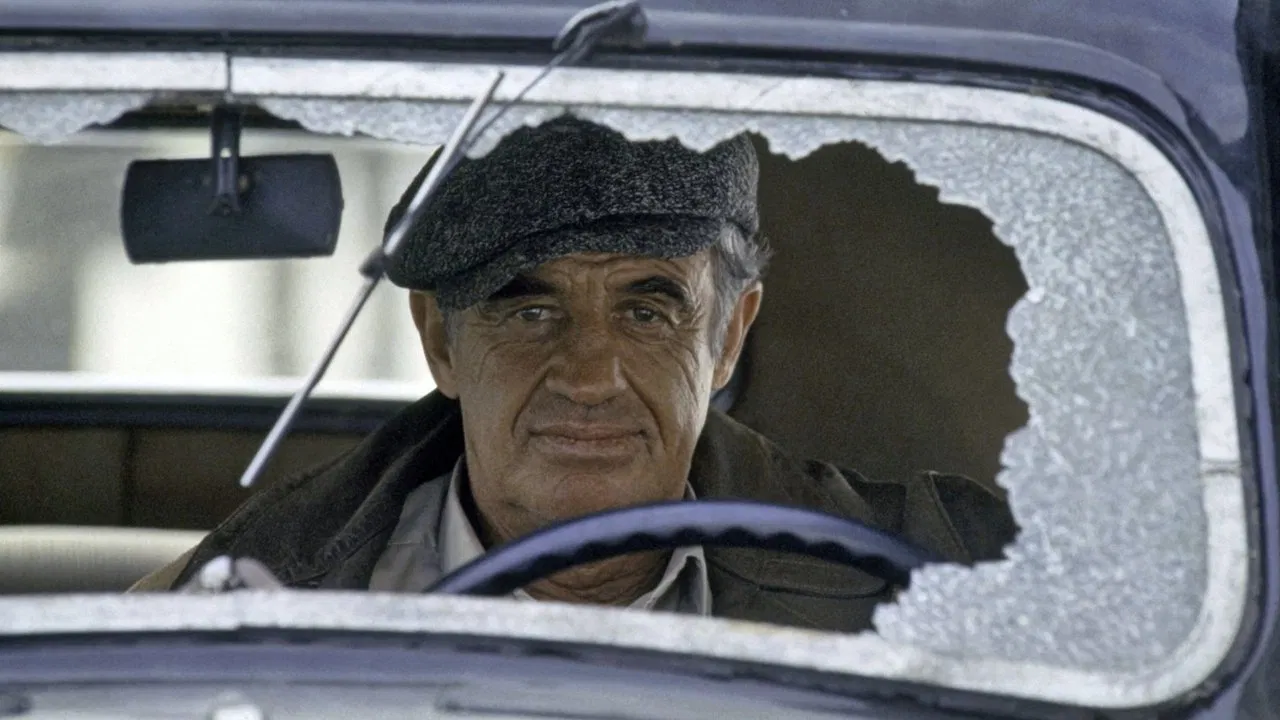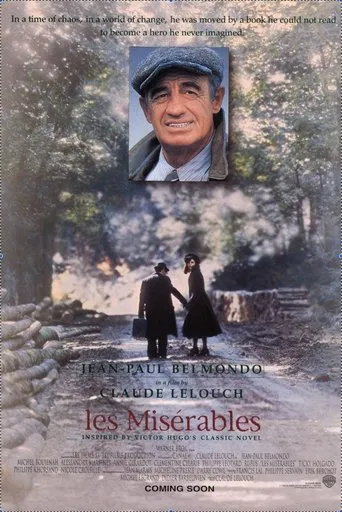

Many French people would tell you that Victor Hugo's "Les Misérables" is the greatest novel ever written. I may not agree that it is the very best, but it is certainly up there challenging. To take such an esteemed book and adapt the story for one of the darkest periods in French history showed enormous courage by both the director and producer.Their courage was worth it. Hugo's story is interwoven with the fictional life of Henri Fortin (Jean-Paul Belmondo) who both portrays the character of Jean Valjean and has Hugo's original story read to him during the film. Fortin's life mirrors that of Valjean, but set in a later period.The film shows that Hugo's story is timeless. The film remains true to the spirit and sequence of the original story although the setting is quite different. To pull off such an audacious feat speaks volumes for the skill of the film makers. It is a true homage to a truly great story. It is worth taking the time to let this film absorb you.
... View MoreIf you search IMDb for "Les Miserables," you'll get 19 films under the IMDb "Titles (Exact Matches)." The dates of these cover 101 years, from 1909 to 2010! But the original title of this remarkable 1995 version is "Les Misérables du vingtième siècle"(the miserable ones of the twentieth century.) The film title credits read "Les Miserables of Victor Hugo" but then adds "freely adapted" by Claude Lelouch." Lelouch was also the director and producer.I saw the film on television in the 4:3 format. I would have preferred letterbox so I could have enlarged it to fit in my wide screen plasma TV, but the film is in French and the subtitles in letterbox format would have been hard for people viewing it on older sets to read. (I found the subtitles to be very easy to read.) But I don't think much was lost by trimming the edges of the original film. The main characters in the film are Henri Fortin (Jean-Paul Belmondo), the father and his son by the same name, who earns the nickname of Jean Valjean (Victor Hugo's protagonist) because of events in his life that correspond to those of Hugo's Valjean. When the novel is read to Henri Fortin to help him understand why the nickname, the story telling dissolves into an enactment of the novel. In those sequences we see Fortin playing the part of Valjean.I had a little difficulty following the start of the movie, which opens with a wretchedly sad Henri Fortin as Jean Valjean regretting something he did and calling after "the little chimney sweep." (I am not familiar with that part of Hugo's novel. We learn later on what Valjean regretted.) It then switches to a major ball being held in France to celebrate New Year's Day at the onset of the 20th century. This leads up to Henri Fortin the father being falsely accused of murder. This section of the film deals with Henri senior's life as a convict, his wife's and young son's lives during that time, and his escape attempt.Things advance from there to his son, now grown and a prize fighter, at the end of World War I. The film then moves forward about 20 years and an older Henri junior is now a retired French champion driving a moving van as German rule begins to sweep Europe near the start of World War II (a couple of years before Pearl Harbor caused the US to enter that war.) I think that the more you know of the Victor Hugo book the more you will like this film, but I think that even without any knowledge of the original you will still get a lot out of watching it.From then on there is no dull moment as the protagonists move through lives of anguish and deceptions.Although the film is full of tragedy, it leaves you filling good at the end.
... View MoreBased upon Victor Hugo's classic nineteenth century novel is this lavish epic about humanity's many levels of compassion, selfishness, brutality and love. In short, the good and evil of mankind.One can immediately appreciate writer/director Claude Lelouch's passion and sincere admiration for Hugo's story, as he lovingly relates to us the story of Henri Fontin, a man whose miserable beginnings yet big heart parallel those of the famed Jean Valjean.Lead actor Jean-Paul Belmondo is thoroughly enjoyable as the generous spirited Fontin, also playing on occasion the heroic Jean Valjean in flashback. Strong support comes from Michel Boujenah and Alessandra Martines as a fugitive Jewish couple who turn to Fontin for help. Lelouch's daughter Salome plays the couples' tragic child who is left in a Catholic orphanage to hide her true identity. Clementine Celarie is moving in her brief role as Fontin's mother, and playing "Javert" is a convincing Philippe Khorsand. All this intense acting and Lelouch's passionate direction ensure a most involving, highly rewarding film.Cinematography is often inspired (again Claude Lelouch), capturing rural France. Art direction from Jacques Bufnoir is solid, and music comes from Francis Lai, Erik Berchot, Didier Barbelivien, Michel Legrand and Phillipe Servain. Helene de Luze provides the editing.Monday, March 24, 1997 - Hoyts CroydonClaude Lelouch lovingly tells this war time variation on Victor Hugo's novel. Purists and fans of the musical may not get a great deal from this translation, but lovers of quality, epic cinema will.All credit must go to Lelouch for the way he nurtures this film, delivering excellence in all areas throughout the entire running time. Acting performances range from solid to riveting, and the entire technical crew astound also. The music came from several sources.By far the best French film I have ever seen.Monday, November 27, 1997 - Video
... View Moreone of the greatest French films of the last few decades yet, sadly, a film almost entirely overlooked by most critics...including the Lelouch-bashers of the contemporary French film industry.make no mistake: most of those who have seen it--certainly everyone I know who has seen it--tend to regard it as a genuine classic of world cinema and the finest film of the year of its release.powerful, skillful and impassioned, I can recommend it without reservation.a triumph for all concerned.
... View More